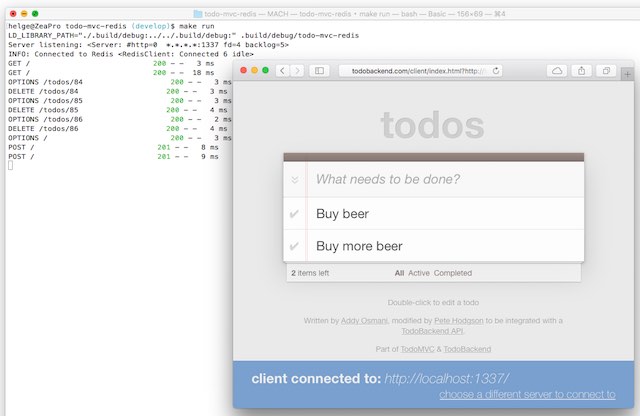Read this, Read that, Redis.
Noze.io is starting to get persistent. Publish “Hi!” to Redis.

Starting with Noze.io 0.3 a Redis client is included.
Redis is a very fast, scalable and easy to use key-value
store.
One common usecase is to store connect sessions in Redis, but it can be used
for all kinds of applications.
Checkout the Redis website to learn more about it.
The Noze.io implementation is a clean-room, Noze.io specific Redis implementation. As usual it is fully asynchronous, non-blocking and ßatch based.
Noze.io Redis Client
So how does that look in Noze.io? We took inspiration by the node-redis module and modeled the Noze.io version after that. The result looks almost exactly the same, except that you get an AOT compiled, statically type-checked binary. It is also a great demo on how static typing rarely helps to avoid real-world bugs 🤓
OK, lets jump in - Connect to Redis, store a key and retrieve it afterwards:
import redis
let client = redis.createClient()
client.set("message_of_the_day", "Hello World", redis.print)
client.get("message_of_the_day") { err, reply in
console.log("Reply: ", reply)
}
Note redis.print. This is a function which can be used as a callback
for debugging/testing purposes. It just logs the err/reply coming back.
Redis can store simple key/value pairs, but it can also store more complex stuff
as lists, sets or hashes. A demo for the latter (essentially [String:String]
dictionaries) is contained in our
todo-mvc-redis.
Another feature Redis provides alongside KVS is a Pub/Sub broker. Think “Slack” or “IRC”. Your client subscribes to some channels and gets notified when messages get published on those channels. Sample:
let sub = redis.createClient(), pub = redis.createClient()
sub.onSubscribe { channel, count in
pub.publish("io.noze.random", "Hey guys!")
pub.publish("io.noze.random", "What is the reldate for Noze.io 6.3.2?")
}
sub.onMessage { channel, message in
console.log("#\(channel): ", message)
}
sub.subscribe("io.noze.random")
You get the idea.
New Example: todo-mvc-redis
To give a more complete example we added
todo-mvc-redis.
It is a sample Todo-Backend
which persists the todos as Redis hashes and uses Redis INCR to maintain a
primary key sequence.

Check it out! It actually works :-)
Changes in 0.3.0 (from 0.2.11)
- new module:
redis- This is a pure Swift, clean-room Noze.io specific Redis client. Fully asynchronous and non-blocking. And quite likely full of bugs :-)
- Alongside: new example
todo-mvc-redistodo-mvc-redisis a sample Todo-Backend which persists the todos as Redis hashes
- global changes
- All code has been converted to use Swift 3 style types and methods. That is,
ErrorProtocolinstead ofErrorType,Sequenceinstead ofSequenceTypeand so on. Also: Most code is now using Swift 3 style collection APIs, likeremove(at:)instead ofremoveAtIndex()orappend(contentsOf:)instead ofappendContentsOf(). The necessary compatibility aliases are contained in thecoremodule. So just import that and you are Swift 3-stylish. - All code has been converted from
dispatch_async(Q)to the newQ.async()“Objective-GCD” API - Various workarounds to please Swift 3.0 Preview 2, e.g. use
sizeof(T.self)instead ofsizeof(T).
- All code has been converted to use Swift 3 style types and methods. That is,
xsysmodule- Added some support for
timeval_t - Added
timeval_anyprotocol which enhances three Unixtimevalue types (timespec_t,timeval_t,time_t) with common functionality (likelet now = timeval_t.now) - Added a tiny testsuite
- Added support for
uuid_generateand companions. Unfortunately this is not part ofGlibcand hence only available onDarwin. (Linux has this in a separate library, libuuid)
- Added some support for
coremodule- Enhance Swift 2 to support required Swift 3 style types and methods
- Changed
CIDictionaryto be more Swift 3 style - Added a debug facility to track core.retain/release calls to debug retain counting issues. Core.retain is used to keep the process alive while async code is running.
eventsmoduleonErroris marked@discardableResulton Swift 3 now, but that just produces a follow-up compiler warning
streamsmodule- mark some internal stuff as
publicto please the Linux linker when using generic classes (might be a bug, we’ll see how it looks in Swift 3 final)
- mark some internal stuff as
fsmodule- Fixed bug in tracking the number of active read and writes
consolemodule- The secondary arguments to the various console functions
(
log,warnetc.) now takeAnyvalue (wasCustomStringConvertiblebefore). This means you can now do such:console.log("stream: ", stream).
- The secondary arguments to the various console functions
(
dnsmodule- The callback signature has changed to a proper
(err,address)from(address,err) - Changed the
familyargument oflookupfromInt32tosa_family_t. Node uses just4and6values to specify IPv4/IPv6, we essentially allow any validPF_value.
- The callback signature has changed to a proper
netmodule- The connect options gained a
familyproperty which defaults to IPv4. Previously it just used the first matchdns.lookupreturned, which sometimes is IPv4 and sometimes IPv6. Now you can specify your desired family. - A specific
SocketErrorenum was added (was usingPOSIXErrorbefore)
- The connect options gained a
processmodule- Swift 3: Internal change:
processInfois now a property
- Swift 3: Internal change:
child_processmodule- Some bitz of error printing/asserts. Sometimes this seems to have issues.
jsonmodule- Provided Swift 3 “kw-less” wrapper. That is, you can now call
stringify(obj)instead ofstringfy(object: obj).
- Provided Swift 3 “kw-less” wrapper. That is, you can now call
connectmodule- The signature of the
nextcallback of middleware functions changed from(String)->Voidto(Any)->Void. In preparation of support for error middleware. - Added the
connect.pausemiddleware. This is just used to simulate latency, i.e. you can slow down request handling.
- The signature of the
A word about Swift 3.0 Preview 2
Noze.io builds against Swift 3.0 Preview 2 on macOS. It does build against Swift 3.0 Preview 2 on the Linux Travis CI is running, so it should work.
However: We didn’t yet get a libdispatch version running against Swift 3pr2
on an own Linux instance. So you may need to stick to Swift 3 Preview 1 on Linux
if you really want to use Swift 3 already.
Our recommendation is still the same: Stay with Swift 2.2/2.3 until Swift 3 -
particularily Swift 3 libdispatch on Linux - is sufficiently stable.
Getting the stuff
Well, as usual, head over to
GitHub
and checkout the master branch or fetch the 0.3.0 tag.
Happz noziredizing!
hh

